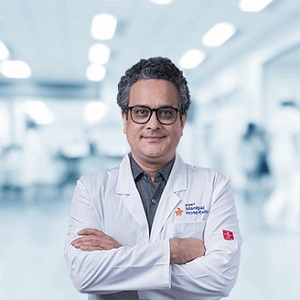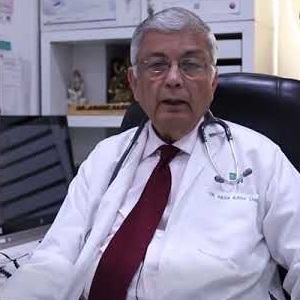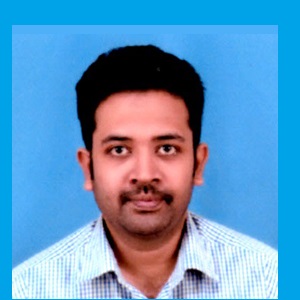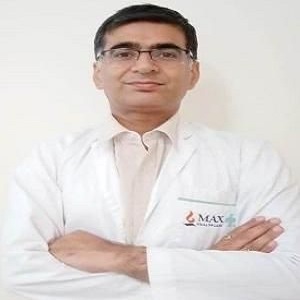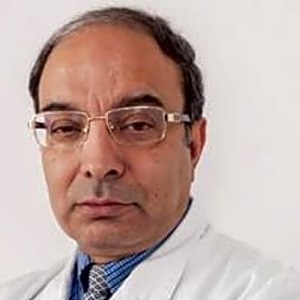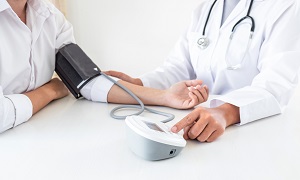Best Doctors in India for Hemodialysis
- Nephrologist, Gurugram, India
- Over 25 years’ experience
Profile Highlights:
- Dr. Lakshmi Kant Tripathi throughout his career has supervised around 54000 hemodialyses at different centers in Delhi NCR, with great clinical outcomes.
- He is successfully engaged in kidney transplantations, including Incompatible & High-risk ones. He is a specialist in managing Resistant hypertension, difficult-to-treat Nephrotic Syndromes, Complicated UTIs & high-risk Transplants.
- Nephrologist, Gurugram, India
- Over 40 years’ experience
Profile Highlights:
- Dr. Manju Aggarwal is one of the leading nephrologists in India and has many years of experience in Nephrology at some of the best medical institutions including the University of Minnesota.
- She has expertise in treating critically ill patients with acute and chronic renal failure and those on dialysis and renal transplant.
- Dr. Aggarwal is also experienced in managing difficult and high-risk renal transplants, especially for those who need desensitization.
- Nephrologist, New Delhi, India
- Over 22 years’ experience
Profile Highlights:
- With over 22 years of experience, Dr. Saurabh Pokhriyal is currently associated with Manipal Hospitals in Dwarka, Delhi. Known for his skill in Nephrology and Renal Transplant Medicine, Dr. Saurabh Pokhriyal has a distinct fascination with complex cases of nephrology as well as in performing ABO-contrary transplants.
- He has worked additionally for the Primary treatment of Glomerular Diseases. Dr. Pokhriyal has also authored several articles that have been distributed in different national as well as international chapters and books.
- Nephrologist, New Delhi, India
- Over 45 years’ experience
Profile Highlights:
- Dr. Ashok Sarin is a specialist in Kidney Diseases, Dialysis, and Transplantation. He is currently working at Indraprastha Apollo Hospital, Sarita Vihar, New Delhi.
- After receiving his education at the All India Institute of Medical Sciences, New Delhi, Dr. Ashok Sarin proceeded to Northern Ireland U.K. where he received training under Dr. Mary Mcgeown at the prestigious Belfast City and Royal Victoria Hospital Queens University of Belfast U.K. He is known to receive World Class Training in treating all types of Kidney Diseases, Hemodialysis, CAPD, and Live and Cadaver Kidney Transplantation.
- He is a member of several associations such as the Indian Society of Nephrology, Delhi Nephrology Society, North Zone Society of India, as well as the Association of Physicians of India. He is also the President of the Delhi Nephrology Society.
- Nephrologist, Gurugram, India
- Over 18 years’ experience
Profile Highlights:
- Currently working as Associate Director, Nephrology at Medanta, Gurugram; Dr. Jha has several years of rich experience in his field.
- His area of expertise is renal transplantation, hemodialysis, chronic kidney diseases, and acute kidney injury. Throughout his career, he has treated thousands of patients from all over the country and also provides his patients with the best medical care.
- Dr. Jha completed DNB Nephrology from Manipal Hospital; Bengaluru in 2011. He has wide experience in pre as well as post-transplant care.
- Nephrologist, New Delhi, India
- Over 30 years’ experience
Profile Highlights:
- Dr. Alka Bhasin is a General Physician as well as a Nephrologist and a Renal Specialist, based in Saket, New Delhi. She completed her Fellowship in Nephrology from Thomas Jefferson University Hospital in 2000.
- Some of the services provided by Dr. Alka Bhasin include Hemodiafiltration (HDF), Kidney Transplant, Renal Angioplasty & Stenting, Laparoscopic Nephrectomy, Hemodialysis, etc.
- Nephrologist, Chennai, India
- Over 14 years’ experience
Profile Highlights:
- Dr. Jagdish K is currently designated as the Senior Consultant of Nephrology with a vast experience of 14 years.
- Dr. Jagdish K is well versed in Temporary Haemodialysis Catheters, Bone Marrow Aspiration and Biopsy, Lumbar Puncture, Arterial Lines, and Renal Biopsy.
- His special interests lie in Glomerulonephritis, Extracorporeal treatments, Post-Transplant Infections, and Renal Transplants across blood groups and in highly sensitized individuals.
- Nephrologist, New Delhi, India
- Over 20 years’ experience
Profile Highlights:
- Dr. Rahul Grover is known to be one of the finest renal doctors and nephrologists in New Delhi. He offers excellent care to all his patients.
- He holds an experience of several years and has extensive knowledge in the field of medicine.
- He is also an esteemed member of the Indian Society of Nephrology (ISN), and the Indian Society of Organ Transplantation (ISOT), and this further adds to his credibility.
- Nephrologist, Gurugram, India
- Over 15 years’ experience
Profile Highlights:
- Known as one of the best nephrologists in the NCR region, Dr. Manish Jain holds a special interest in renal transplants as well as clinical nephrology.
- His compassionate patient care and lifestyle advocacy have helped patients recover from various disorders.
- Throughout his career, Dr. Manish Jain has published several papers in India and is also a member of several medical associations.
- Nephrologist, Gurugram, India
- Over 31 years’ experience
Profile Highlights:
- Dr. Vijay Kher is a well-known nephrologist with over 31 years of experience. He did his MBBS from Glancy Medical College, Amritsar. He completed his DNB – General Medicine from the Postgraduate Institute of Medical Education and Research, Chandigarh in 1977.
- Some of the services provided by Dr. Kher are ABO Incompatible Transplantation, Steroid Free Immunosuppression, Clinical Immunosuppression, Kidney Disease Treatment Acute Renal Failure, etc.
Best Hospitals in India for Hemodialysis
Fortis Hiranandani Hospital, Mumbai
- City: Mumbai, India
Hospital Highlights:
- Fortis Hiranandani hospital was established in 2007.
- The hospital is an advanced tertiary care, multi-specialty hospital equipped with 149 beds.
- The hospital is equipped with a super ICU to provide emergency medical care to critically ill patients.
- The hospital is NABH accredited.
- The critical care facility in the hospital is augmented with the state-of-the-art facilities that facilitate speedier diagnosis and efficient monitoring.
- The hospital provides specialty medical services in cardiology, orthopedic science, pediatric science, neurology, diabetic care, urology, nephrology, ENT, obstetrics, gynecology, cosmetic surgery, bariatric surgery, neuro and spine care.
Fortis Hospital, Anandpur, Kolkata
- City: Kolkata, India
Hospital Highlights:
- Fortis Hospital, Anandapur, Kolkata is a world-class super-speciality equipped with the latest technologies in the medical world.
- The hospital is NABH accredited.
- This state-of-the-art facility specializes in cardiology and cardiac surgery, urology, nephrology, neurosciences, orthopaedics, digestive care, emergency care and critical care.
- The hospital, governed by integrated Building Management System (IBMS), has a pneumatic chute system, for quick vertical and horizontal transportation between floors, facilitating speedy transfer of patient specimens, documents, reports, and medicines to the concerned departments.
- The hospital also has a nephrology department with over 28 advanced dialysis units.
Fortis Hospital Banerghatta, Bengaluru
- City: Bengaluru, India
Hospital Highlights:
- Fortis Hospital Bannerghatta, Bengaluru was established in 2006.
- The hospital is a 276 bedded multi-specialty tertiary care facility.
- The hospital specializes in cutting-edge medical technology and dedicated patient care services.
- The hospital is equipped with state-of-the-art technologies like trans-radial angioplasty, trans-abdominal cardiac surgery, and computerized TKR navigation surgery.
- The hospital provides specialty medical services in cardiology, cardiac surgery, orthopedics, neurology, neuro-surgery, GI, and Minimal Access Surgery (MAS).
Fortis Hospital, Malar, Chennai
- City: Chennai, India
Hospital Highlights:
- Fortis Malar was established in 1992 and was formerly known as Malar Hospital.
- The hospital specializes in cutting-edge medical technology and dedicated patient care services.
- The hospital is multi-specialty, tertiary care facility with 180 beds.
- The hospital offers comprehensive medical care in specialties such as cardiology, cardio-thoracic surgery, neurology, neurosurgery, orthopedics, nephrology, gynecology, gastroenterology, urology, pediatrics, and diabetes.
Gleneagles Global Hospital, Parel, Mumbai
- City: Mumbai, India
Hospital Highlights:
- Gleneagles Global Hospital The 450-bed facility comprises of 17-stories, housing state-of-the-art infrastructure, and advanced medical care facilities.
- The hospital offers end-to-end clinical, surgical, and diagnostic services. It is equipped with a team of eminent medical professionals aided by qualified nurses and medical staff
- The Hospital offers advanced Endoscopic procedures, Hepatobiliary and Liver Surgeries, Surgical and Medical Gastroenterology, Bariatric Surgery, and Robotic surgery.
- The hospital is a center of excellence for Orthopedics, Joint Replacement, Knee Replacement, and Hip Replacement surgery.
Manipal Hospital, Dwarka, Delhi
- City: New Delhi, India
Hospital Highlights:
- Manipal Hospitals, Dwarka, is a super-specialty hospital in Dwarka, New Delhi, which is a part of Manipal Hospitals Group.
- The hospital aims to provide the best treatment on par with international standards at a fraction of the cost.
- Equipped with 380 beds, the hospital is also one of the new age hospitals which are equipped fully with state-of-the-art infrastructure, cutting-edge technology as well as the latest and advanced clinical practices. The hospital also has 13 modular Operation theatres with 118 beds which are solely meant for critical care.
- The hospital comprises internationally acclaimed doctors and highly professional and experienced hospital and medical staff who are able to provide preventive, therapeutic, and diagnostic services all under one roof.
Paras Hospital, Gurugram
- City: Gurugram, India
Hospital Highlights:
- Paras hospital was established in 2006 and is the 250 bedded flagship hospital of Paras Healthcare.
- The is supported by a team of doctors of international and national repute.
- The hospital is NABH accredited and also the first hospital in the region to have a NABL accredited laboratory.
- The hospital provides specialty medical services in around 55 departments including Neurosciences, Joint Replacement, Mother & Child Care, Minimal Invasive Surgery, Gynecology and Obstetrics, Ophthalmology, Dermatology, Endocrinology, Rheumatology, Cosmetic and Plastic surgery.
- The hospital is equipped with state-of-the-art technologies.
S L Raheja Hospital, Mahim, Mumbai
- City: Mumbai, India
Hospital Highlights:
- SL Raheja hospital is a 140-bed multi-specialty tertiary care hospital that is being managed by Fortis Healthcare Ltd.
- The hospital is a benchmark in healthcare and medical facilities in the neighborhood of Mahim & the western suburbs.
- L.Raheja Hospital, Mahim has one of the most effective ICU and Casualty care services.
- The hospital provides specialty medical services in Cardiology, Oncology, Neurology, Orthopedics, Mother & Child Care, and in Diabetes.
Wockhardt Hospitals, Mumbai
- City: Mumbai, India
Hospital Highlights:
- Wockhardt Hospitals were established in the year 1973, originally called First Hospitals and Heart Institute.
- Wockhardt Hospitals are super specialty health care networks in India, nurtured by Wockhardt Ltd, India’s 5th largest Pharmaceutical and Healthcare company.
- Wockhardt Hospitals is associated with Partners Harvard Medical International, an international arm of Harvard Medical School, USA.
- Wockhardt Heart Hospital performed India’s first endoscopic heart surgery.
- The hospital has a state-of-the-art infrastructure equipped with the latest technologies and modern equipment.
- It has special Centers of Excellence dedicated to the major specialties to provide hassle-free and high-quality clinical care.
Pushpawati Singhania Hospital & Research Institute, New Delhi
- City: New Delhi, India
Hospital Highlights:
- Established in 1996, Pushpawati Singhania Research Institute is one of the top hospitals in the NCR region, as well as one of the top facilities in India for gastroenterology. The hospital is one of South Asia’s first institutes in medical and surgical treatment for diseases related to digestion.
- The hospital is equipped with state-of-the art facilities coupled with the latest equipment as well as renowned consultants from various parts of India as well as other parts of the world.
Hemodialysis
Hemodialysis is a process of filtering wastes and fluid from your body, after your kidneys are no longer healthy. Hemodialysis is one of the ways to treat advanced kidney failure and it helps one carry on an active life despite having failed kidneys.
With hemodialysis, one also needs to follow a healthy diet, take medications regularly as well as follow a strict treatment schedule. Although hemodialysis is a serious responsibility, you can work closely with a healthcare team rather than shouldering it alone. Dialysis can be done in a hospital or in your home as well. Based on your medical condition, it is always up to you and your doctor to decide, which option is best.
Purpose
Your doctor can help you determine when you should start hemodialysis based on several factors, which include your overall health, kidney function, signs and symptoms, quality of life and also your personal preferences.
Your doctor uses the estimated glomerular filtration rate, to measure how well your kidney is functioning and this helps in planning your treatment including when to start hemodialysis.
Hemodialysis helps your body control blood pressure as well as to maintain the proper balance of fluid as well as various minerals, like potassium and sodium in the body. Normally, hemodialysis begins quite sometime before your kidneys have shut down to the point of causing complications that can be life-threatening.
Diabetes, high blood pressure, blood vessel inflammation, kidney cysts are some of the main causes of kidney failure. Your kidneys can also shut down all of a sudden after a severe illness, a heart attack or complicated surgery, or any such serious problem. Sometimes certain medications might also cause kidney injury. Some people with severe long-standing kidney failure can opt for a different path, choosing maximal medical therapy, which is called maximum conservative management as well, instead of dialysis. Some can also go choose to go for a kidney transplant.
Preparation
Preparation for hemodialysis usually starts several weeks to months before your first procedure. For allowing easy access to your bloodstream, a surgeon will be creating vascular access. The access provides a mechanism for a small amount of blood to be safely removed from your circulation after which it is returned to you in order for the process of hemodialysis to work. The surgical access requires time to heal before you begin hemodialysis treatments.
There are three different types of accesses:
Arteriovenous fistula
A surgically created AV fistula, which is a connection between an artery and a vein, usually in your non-dominant arm. Due to its effectiveness as well as safety, this is the most effective as well as safe method.
Central venous catheter
If you require emergency hemodialysis, a plastic tube might be inserted into a large vein in your neck or near your groin. The catheter is for a temporary basis.
AV graft
If your blood vessels are found to be too small for creating an AV fistula, your surgeon may instead choose to create a path between an artery and a vein using a flexible, synthetic tube which is called a graft.
Procedure
During the treatment procedure, you sit or recline in a chair while your blood flows through the dialyzer, a filter that acts as an artificial kidney to clean the blood. At this time, you can read a book, watch a movie or even take a nap. If you receive it during the night, you can just sleep while the procedure is on.
Preparation
Starting
At first, two needles will be inserted into your arm through your access site, and taped in place to make it remain secure. Each needle is attached properly to a flexible plastic tube that connects to a dialyzer. Through one tube, the dialyzer filters the blood a few ounces at a time, which allows wastes and extra fluids to pass from your blood into a cleansing fluid which is called dialysate. Then, the filtered blood returns to your body, with the help of the second tube. The needles in your fistula or graft can be uncomfortable and most patients get used to this within some time. Talk to your dialysis care team and make sure you are comfortable during the treatment.
Symptoms
Keep in mind that you might be experiencing some symptoms like nausea or abdominal cramps. This is due to the fact that excess fluid is being pulled from the body, especially if you are having hemodialysis three times a week, rather than more often. If you feel too much discomfort, you can ask your care team to help minimize the side effects by taking measures like adjusting the speed of your hemodialysis, your medication or your hemodialysis fluids.
Monitoring
Finishing
When the hemodialysis is complete, the needles are removed from your access site. After this, a pressure dressing is applied for preventing bleeding. Your weight might need to be recorded once more. After this, you are free to carry on your usual activities, until your next session.
Results
If you had a sudden kidney injury, you might need hemodialysis only once in a short time, until they recover. If you had reduced kidney function before a sudden injury to the kidneys, the chances of full recovery back to independence from hemodialysis are quite less.
Three-times a week hemodialysis is quite common and according to a few types of research, it has been suggested that home dialysis is linked to:
- Increased well-being
- Better quality of life
- Reduced symptoms and less cramping, headaches as well as shortness of breath
- Improved appetite, sleeping patterns, energy level and the ability to concentrate.
Your hemodialysis care team will monitor your treatment to make sure that you are getting the right amount of hemodialysis to remove enough wastes from your blood. Your weight and blood pressure are monitored very closely before, during as well as after your treatment. About once a month, you will receive these tests:
- Blood tests for measuring urea reduction ratio and total urea clearance, for making sure how well your wastes are being removed from your body.
- Blood chemistry evaluation as well as an assessment of blood counts.
- Measurements of the flow of blood through the access during your hemodialysis.
Risks
Despite its benefits, hemodialysis can also cause a variety of health problems. Some of them include low blood pressure, muscle cramps, sleep problems, itching, anemia, fluid overload, bone diseases, high blood pressure, complications in the access site complications, high potassium levels, inflammation of the membrane which surrounds the heart, amyloidosis or depression.



